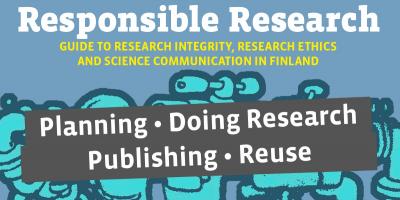The violations of the responsible conduct of research can be classified into misconduct and disregard for the responsible conduct of research.
Allegations of research misconduct and disregard for the RCR are dealt with through the procedure of handling alleged violations of the responsible conduct of research. This is referred to as the RCR process.
Disregard for the responsible conduct of research and for research misconduct violate the responsible conduct of research, but they may also violate the law.
In addition to the two categories mentioned above, other types of ethically irresponsible research practices may occur in research communities. However, sincere differences of opinion that result from the interpretations and assessments of research results belong to academic and scientific debate and do not violate the responsible conduct of research.
Research misconduct
Research misconduct refers to misleading the research community and often also to misleading decision-makers. This includes presenting false data or results to the research community or spreading false data or results in a publication, in a presentation given in a scientific or scholarly meeting, in a manuscript that is intended to be published, in study materials or in applications for funding. Furthermore, misconduct refers to misappropriating other researchers’ work and to representating other researchers’ work as one’s own.
In international guidelines, misconduct is usually divided into three categories: fabrication, falsification and plagiarism, which is also referred to as the FFP categorisation. The tradition in Finland has been to maintain a more comprehensive and analytical categorisation; hence misappropriation is separated from plagiarism and is considered to be a distinct category.
Fabrication refers to reporting invented observations to the research community. In other words, the fabricated observations have not been made by using the methods as claimed in the research report. Fabrication also means presenting invented results in a research report.
Falsification (misrepresentation) refers to modifying and presenting original observations deliberately so that the results based on those observations are distorted. The falsification of results refers to the unfounded modification or selection of research results. Falsification also refers to the omission of results or information that are essential for the conclusions.
Plagiarism, or unacknowledged borrowing, refers to representing another person’s material as one’s own without appropriate references. This includes research plans, manuscripts, articles, other texts or parts of them, visual materials, or translations. Plagiarism includes direct copying as well as adapted copying.
Misappropriation refers to the unlawful presentation of another person’s result, idea, plan, observation or data as one’s own research.
Disregard for the responsible conduct of research
Disregard for the responsible conduct of research manifests itself as gross negligence and carelessness during the research process. This type of behaviour can be identified when researchers engage in:
- denigrating the role of other researchers in publications, such as neglecting to mention them, and referring to earlier research results inadequately or inappropriately;
- reporting research results and methods in a careless manner, resulting in misleading claims;
- publishing the same research results multiple times ostensibly as new and novel results (redundant publication, also referred to as self-plagiarism);
- misleading the research community in other ways.
Other irresponsible practices
Other irresponsible practices may also occur in research. For example, researchers may engage in:
- manipulating authorship, for example, by including in the list of authors persons who have not participated in the research, or by taking credit for work produced by what is referred to as ghost authors
- exaggerating one’s own scientific and scholarly achievements, for example, in a CV or its translation, in a list of publications, or on one’s homepage
- expanding the bibliography of a study to artificially increase the number of citations
- delaying the work of another researcher, for example, through refereed peer reviewing
- maliciously accusing a researcher of RCR violations
- hampering inappropriately the work of another researcher
- misleading the general public by publicly presenting deceptive or distorted information concerning one’s own research results or the scientific importance or applicability of those results
Further information:
Investigation of misconduct in Finland: http://www.tenk.fi/en/investigation-of-misconduct-in-finland
RCR violations: https://www.tenk.fi/en/rcr-violations
Responsible conduct of research: http://www.tenk.fi/en/responsible-conduct-of-research
You might also be interested in
Tämä teos on lisensoitu Creative Commons Nimeä 4.0 Kansainvälinen -lisenssillä. Detta verk är licensierat under en Creative Commons Erkännande 4.0 Licens. This work is licensed under a Creative Commons Attribution 4.0 International license.
